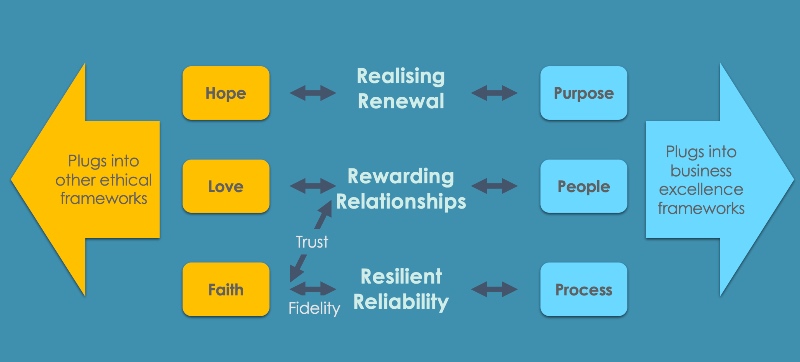A lens on the Kingdom
The second part of the blog series Is Kingdom working? attempts to try to understand the kingdom without parables - and then introduces a framework that connects business best practice to ethical virtues
This is part two of a blog series by Phil Hanson and Terry Young

The Kingdom of heaven is like...
Jesus never offers us a straightforward explanation of the kingdom of God. Instead, he weaves together a composite picture through a set of parables.
Jesus’ parables are both insightful and enigmatic. They offer new meaning when read by a believer. It’s possible to sense what Jesus is saying while being lost about his exact message.
As the host on BBC Radio 4’s game show, I’m sorry, I haven’t a clue, announces Mornington Crescent, the fun is around the rules. Ostensibly they help a winner to get to, ‘Mornington Crescent!’ but they are only a fiction to support the entertainment. The paradox is that this is a game you may enjoy listening to but can never play.
We receive Jesus’ parables differently: we can and do take part, but we don’t have a definitive set of rules. We know that the kingdom is both here and now as well as in the future; it is both substance and mystery; it is Godly wisdom for Earthly application. There is no easy soundbite to describe all this.
‘The most excellent way’…
As people practised the parables, they found themselves living out what the parables describe – a new Kingdom in an everyday world – and so church leaders had to start defining how the growing church would work. Unlike the parables, this guidance needed to be practical, which is how we reach our subheading, a quotation from 1 Corinthians 12:31. It contains some of St Paul’s most lyrical prose and concludes with the words about faith, hope and love.
Faith, hope and love as a Kingdom framework
In our first blog, we presented faith, hope and love as three virtues that satisfied three primal human needs.
We recognised that an instinctive hunger for perfection can only be satisfied by faith, a journey towards that which is genuine, real and authentic. Faith is, thus, the agent of transformation, since striving for perfection without faith doesn’t work in the Kingdom.
Some of us might expect another description of faith in terms of trust. Trust goes with our ability to love, which satisfies our longing for the heart of God. Love in Scripture and in life is not just romance, or friendly feelings: rather it turns marriage into happy families, it binds communities, drives trustworthy transactions, and underpins respect.
Perhaps most elusively, hope is the mysterious something that reaches out to and is satisfied by the glory of God. Hope is reflected in our need for purpose and meaning, for significance, and drives our creative instincts and longing for an enduring legacy.
We argue that as people try to satisfy these primal hungers, we should expect to observe more positive behaviour where they legitimately attempt to fill the void, and more negative behaviour where they use counterfeits.
This of course doesn’t preclude positive behaviour as a result of human effort. We acknowledge common faith in the pursuit of things that work and work well, common love in the forging of faithful relationships, and common hope in creative acts that improve lives and regenerate the planet.
Conversely, we may see negative behaviour in the name of reliability, relationship and purpose that is self-serving and destructive.
The RR3 framework

This framework connects business best practice (in blue) to ethical virtues, in this case, faith, hope and love (in orange). We have so far used Baldrige and the European Foundation for Quality Management (EFQM) models for the blue half of the framework
In this version of the framework, Realising Renewal bridges between Christian hope and business purpose and reflects how we are drawn to take the long view. Realising Renewal embraces aspiration, creativity, vision, and purpose. At the orange end, it is full of longings for a better world and creatively delivers orchards in the desert, conversation for the isolated, and holiday breaks for the weary. At the blue end, it grounds the business in purpose and drives innovation and legacy. At its best, it transforms work into a joyful and fulfilling experience.
Similarly, the term Rewarding Relationships provides a bridge between a robust and wide-ranging Christian love (in orange) with human relationships in business (in blue).
Finally, Resilient Reliability captures the quest for absolute perfection (in orange) as well as the relative drive to make things better by minimising errors and perfecting process (in blue). By separating faith into two streams, trust and fidelity, we arrive at the three stranded framework shown.
In the third blog in this series, we will start to ask difficult questions about how well aligned these matching values really are. Just how far does business best practice go in delivering Kingdom? Are there some blind spots or even contradictions?
Specifically, this framework will be used to do two things.
Firstly, by connecting to an ethical model for behaviour in the workplace, we are beginning show that the workplace is not an ethically neutral territory. The working environment and what we do there is a direct reflection of what those responsible believe.
Secondly, there is much to be gained by exploring other lenses for kingdom and other ethical stances as plug-ins to this approach. They will help to bring to light new gaps and contradictions between current business practice and what God really intends for the outcomes and impacts of business.
For this reason, we are interested to work with partners to explore other ‘plug ins’ including other models of Kingdom, and other faiths as well as the so-called ‘secular religions’.
Together, these findings mean that faith is not a private matter when it comes to work. Whatever faith pitches up at work, it will eventually be reflected in the environment and what people do there.
This is not just an encouragement to Christians to get more involved in seeing their faith bear fruit the workplace, it’s a call to Christian thinkers to take a bigger interest in the world of business.
Image | Freely Photos
Phil Hanson is an engineer by profession. For the latter part of a 30 year career in IBM, he was Lead Principal for IBM’s Manufacturing Industry Consulting Practice. Since IBM, he has been Principal Industrial Fellow at the Institute for Manufacturing at Cambridge University and a Special Advisor to UNIDO for supply chain projects in Africa. He is ordained in the Church of England.
Terry Young is a missionary kid who read science and engineering. After a PhD in lasers, he worked in R&D before becoming a professor, when he taught project management, information systems and e-business, while leading research in healthcare. He set up Datchet Consulting to have fun with both faith and work and worshipped at Baptist churches in Slough for 19 years before moving to the New Forest.
Do you have a view? Share your thoughts via our letters' page.
Baptist Times, 13/10/2022